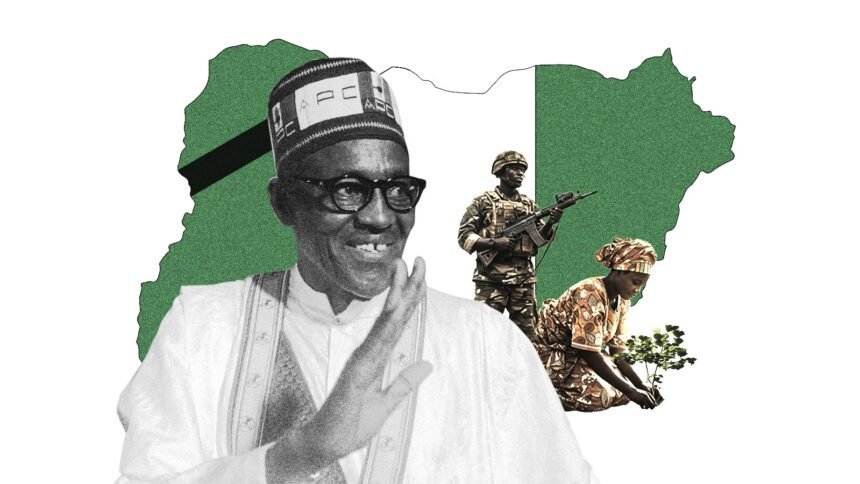Nigeria, the most populous nation in Africa, is once again in mourning—and reflection—following the passing of former President Muhammadu Buhari at the age of 82. For many, his legacy is anything but straightforward. Revered by some as a no-nonsense anti-corruption crusader and reviled by others as an aloof authoritarian who presided over years of insecurity, economic hardship, and democratic erosion, Buhari departs the world stage as one of the continent’s most complex post-colonial leaders.
Buhari’s journey through Nigeria’s tumultuous political landscape is worthy of a historical epic. He first took power in 1983 after leading a military coup that ousted the democratically elected government of Shehu Shagari. At just 41, the then-major general promised to purge Nigeria of corruption and national decay. What followed, however, was a deeply polarizing 20-month military rule marked by draconian decrees, the detention of journalists, and public executions for drug trafficking.
That brief but brutal military regime ended in 1985 when Buhari himself was overthrown in another coup. For years, it seemed he would remain a historical footnote—another stern-faced general in Nigeria’s long gallery of khaki-clad rulers. But democracy, with all its ironies, had other plans. In 2003, 2007, and 2011, Buhari reinvented himself as a civilian presidential candidate, though he lost each time. Many dismissed him as a relic of the past.
Then came 2015.
Riding a wave of public discontent over insecurity, corruption, and economic malaise under President Goodluck Jonathan, Buhari won the presidency in a stunning electoral upset. He became the first opposition candidate in Nigeria’s history to defeat an incumbent president. It was, by any measure, a watershed moment for Nigerian democracy. Many Nigerians, especially in the north, greeted his victory with euphoria.
But governing proved harder than campaigning. His first term, defined by a dogged but often disorganized war against Boko Haram and by an economic recession sparked by falling oil prices, was marred by accusations of selective anti-corruption efforts and chronic absenteeism, especially after his extended medical leave in London. At times, his absence from the public eye sparked wild speculation about his health—or even whether he had been secretly replaced.
Despite growing criticism, Buhari won reelection in 2019. But his second term did little to redeem his image among disillusioned voters. Nigeria’s economy stagnated, inflation soared, and insecurity metastasized from the northeast to nearly every region. Banditry, farmer-herder clashes, separatist agitations, and police brutality became daily features of life. The #EndSARS protests of 2020, a youth-led movement against police violence, marked a major rupture between the state and a generation that had lost faith in his promises.
Still, Buhari remained something of an enigma. In his famously sparse public speeches, he often invoked discipline, nationalism, and moral rectitude. Yet many wondered whether the man who once declared that “corruption will kill Nigeria if we don’t kill corruption” had been overwhelmed by the very system he vowed to reform.
Internationally, Buhari enjoyed a mixed reputation. He was seen as a reliable ally in the fight against terrorism and was praised for his relatively calm handling of electoral transitions. But his reluctance to engage robustly with regional economic integration and his muted response to democratic backsliding in West Africa led some to question his commitment to broader African leadership.
As tributes pour in from across the continent and beyond, the tone is telling. President Bola Tinubu, his long-time rival turned successor, hailed him as “a patriot who served Nigeria with unwavering devotion.” Former Ghanaian President John Mahama called him “a steady hand during turbulent times.” Meanwhile, Nigerian Twitter (or whatever it’s called these days) offered a mixed eulogy: part nostalgia, part relief, part raw honesty.
To Buhari’s supporters, he was a disciplined statesman who tried, against immense odds, to steer Nigeria toward order and integrity. To his critics, he was an out-of-touch relic whose presidency missed historic opportunities and deepened national despair. For most Nigerians, however, he was both: a man of contradictions who symbolized the very tensions tearing at the country’s soul—order versus liberty, tradition versus modernity, idealism versus pragmatism.
Buhari is survived by his wife Aisha and several children. But more enduring than any obituary is the national memory he leaves behind—a memory filled with both hope and heartache, promises made and promises broken.
As Nigeria lowers its flags and holds its breath for what comes next, one thing is certain: Muhammadu Buhari’s story is far from over. It will be rewritten in classrooms, courtrooms, and campaign speeches for years to come. In life and in death, he remains impossible to ignore.










